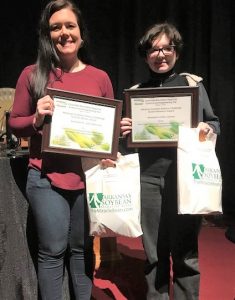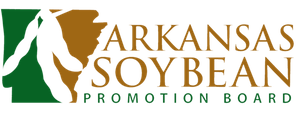Chris Casares – 2019 Arkansas Soybean Science Challenge Award Winner Ouachita Mountain Regional Science and Engineering Fair

Chris Casares, age 17, a senior at Glen Rose High School in Malvern, won the Soybean Science Challenge at the 2019 Ouachita Mountain Science and Engineering Fair at Mid-America Museum in Hot Springs on March 1.
Chris Casares, Glen Rose High School, Malvern
Teacher: Julie Hathcock
Category: Chemistry
Project Title: Wonderful waxes
Abstract: The purpose of this experiment was to test various different types of waxes and compare the effects and results of each one. I questioned whether soybean candles were inferior to other mainstream candles, and if so, how do I improve them so that candle consumers are more likely to buy them? I believed that after the experiments are finished, I would observe the fact that soy candles produce less light, smell more offensive, and have a decent overall color compared to other candles. I used a variety of waxes, pot holders, containers, and other simple items such as wicks, lighters, and scissors for this experiment. My results showed that soy wax candles may be preferred for smaller tasks, rather than for actual light. The results from the five different types of waxes showed the height percentage loss of the following: Yankee Candle 2.7%, Coconut Wax Candle 10.9%, Beeswax Candle, 52.6%, Crayon Wax Candles 80.0%, and Soy Wax Candle 90%. My hypothesis proved to be incorrect, and soy wax candles proved to be a middleman when it comes to candles and their uses.
The continuation of this project focuses on bettering soy candles so the the soy industry for Arkansas improves. By improving soy candles so that the everyday candle user will prefer them and limiting the amount of man-made substances with will increase air quality. Soy was combined with coconut wax and beeswax. There were nine candles made in total and two trials for each mixture. The mixtures were 50/50 soy to coconut, 50/50 soy to beeswax, 75/25 soy to beeswax, 75/25 soy to coconut, 25/75 soy to beeswax and 25/75 soy to coconut. The results showed that the 75/25 soy to beeswax lasted the longest, had a non-offensive odor that could hold a fragrance and had a pale color that could be dyed easily. The hypothesis was correct.
Chris Casares wins 2019 Arkansas Soybean Science Challenge Award at the Ouachita Mountain Regional Science and Engineering Fair
Chris Casares, age 17, a senior at Glen Rose High School in Malvern won the Soybean Science Challenge at the 2019 Ouachita Mountain Regional Science and Engineering Fair held at the Mid-America Science Museum in Hot Springs, March 1.
Casares received a $300 cash award provided by the Arkansas Soybean Promotion Board at the awards ceremony. Her science project titled “Wonderful waxes” also received second place in Chemistry at the regional fair.
Casares will compete at the Arkansas State Science and Engineering Fair March 29. Julie Hathcock, Casares’ teacher, won the $200 Soybean Science Challenge Teacher Mentor Award. Hathcock noted students taking the Soybean Science Challenge in her class gained first-hand knowledge of Arkansas soybean agriculture, especially the issues soybean farmers faced. Her students also gained real-world experience in growing and working with soybeans and products made from soybeans. Hathcock’s goals for her students were for them “to gain knowledge of Arkansas soybean agriculture and to experience a hands-on project that could potentially be beneficial to the sustainability of soybean production.”
Casares said winning the 2019 Soybean Science Challenge was an experience she will never forget. “The best part about winning The Challenge is that it has encouraged me to continue researching the subjects that I’m studying, in order to help our earth and to help industries with improved sustainability,” she said.
Alex and Ginger Casares, Chris’ parents, were extremely proud of her award. “Chris has a great interest in all fields of science. She is very thorough and wants gain as much knowledge as she can,” they said.
The part of the Soybean Science Challenge course that appealed most to Casares was learning about how much soybeans are used in our lives. “I never realized soy is used as much as it is. I enjoyed learning about the use of soybeans for biodiesel and for animal food,” she said.
Hathcock noted Chris is very involved in her Environmental Science class. “She participates in class discussion and is eager to learn science in general. She is very detailed and works hard on class assignments and projects.” Hathcock also discussed her own growth in knowledge about soybeans due to the Soybean Science Challenge, “I gained knowledge of Arkansas soybean production and problems faced being a farmer. I also realized that the soybean industry is a huge diverse industry that employs all types of people with various backgrounds and degrees. People in the soybean industry aren’t just ‘farmers’. I also learned that Arkansas soybean growers are investing in our youth’s future by providing the Soybean Science Challenge award money. It is humbling to know they are giving back to our youth!”
“The Soybean Science Challenge provides an opportunity for Arkansas High School students to participate in scientific research that can impact the State of Arkansas as well as the world. Soybean Science Challenge student researchers learn about this important commodity crop and its many uses including feeding the world, development of biofuels and sustainable products. The Soybean Science Challenge helps students develop an understanding of the challenges and complexities of modern farming,” said Dr. Julie Robinson, Assistant Professor and director of the program.
“The goal of the Arkansas Soybean Science Challenge is to engage students in “real world” education to support soybean production and agricultural sustainability,” said Gary Sitzer, a member of the Arkansas Soybean Promotion Board. “The program also rewards scientific inquiry and discovery that supports the Arkansas Soybean Industry.”
The Arkansas Soybean Science Challenge was launched in January 2014 to 9-12th grade science students. Students who successfully completed the online course were eligible to have their original soybean-related research projects judged at the 2019 ISEF-affiliated Arkansas Science and Engineering Fairs.
Information on the 2019-2020 Arkansas Soybean Science Challenge will be available in summer 2019. For more information, contact Dr. Julie Robinson at jrobinson@uaex.edu or Diedre Young at dyoung@uaex.edu.
The Cooperative Extension Service is part of the University of Arkansas System Division of Agriculture.
